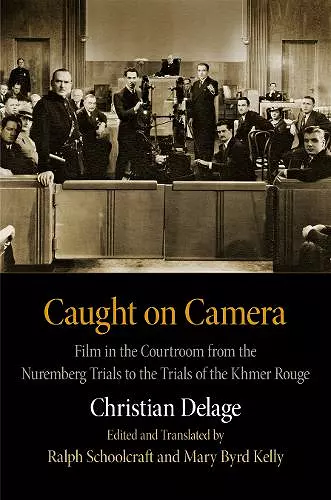Caught on Camera
Film in the Courtroom from the Nuremberg Trials to the Trials of the Khmer Rouge
Christian Delage author Mary Byrd Kelly translator Ralph Schoolcraft editor
Format:Hardback
Publisher:University of Pennsylvania Press
Published:5th Dec '13
Currently unavailable, and unfortunately no date known when it will be back

Combining the practical knowledge of a renowned director with the perspective of a historian and media specialist, Christian Delage explores the conditions and consequences of using film for the purposes of justice and memory by examining archival footage from war crime trials from Nuremberg to the present.
When the Allied forces of World War II formed an international tribunal to prosecute Nazi war crimes, they introduced two major innovations to court procedure. The prosecution projected film footage and newsreels shot by British, Soviet, and American soldiers as they discovered Nazi camps. These images, presented as human testimony and material evidence, were instrumental in naming and prosecuting war crimes. At the same time, the Nuremberg tribunal was filmed so that the memory of "the greatest trial in history" would remain strong in future generations. In the decades that followed, the use of film in the courtroom greatly influenced the conduct of the Eichmann trial—and subsequently the trials of Klaus Barbie, Paul Touvier, and Maurice Papon in France, as well as the proceedings against Slobodan Milošević and the Khmer Rouge Kang Kek lew.
Combining the practical knowledge of a renowned director with the perspective of a historian and media specialist, Christian Delage examines archival footage from these trials and explores the conditions and consequences of using film for the purposes of justice and memory. Revised and expanded from the original French publication, Caught on Camera retraces the steps by which the United States pioneered jurisprudence that sanctioned the introduction of film as evidence and then established the precedent of preserving an audiovisual record of those proceedings. From the Nuremberg trials to the current Khmer Rouge trials, Delage considers how national attitudes toward the introduction of filmic evidence in court vary widely, and how different countries have sought to use film as a recordkeeping medium. Caught on Camera demonstrates how reproduced images, as evidence, testimony, and archival documentation, have influenced the writing of modern history.
"While other scholars have focused on film-as-evidence or trial-as-film, Christian Delage, a historian and documentary filmmaker, addresses both in this meticulously researched book. Tracing the double history of the use of film in legal cases and the filming of court proceedings, Delage reveals how what we see on film in and of human rights trials is a modern construction rooted in the Holocaust and its aftermath. . . . Caught on Camera will be of interest to anyone wanting a historical lens through which to analyze our culture's current obsession with cell phone-generated footage and its potential to transform adjudication for human rights abuse." * American Historical Review *
"Caught on Camera provides an invaluable overview of the role films played in the historic international criminal trials that so indelibly marked the second half of the twentieth century. Ranging in scope and rich in reference, this admirable book shows how prosecutors used films as evidence in court and how court sessions were themselves filmed and widely diffused for public audiences. As the international community continues to struggle with the legacies of Cambodia, Bosnia, Rwanda, and Darfur, the original perspectives Christian Delage offers will helpfully inform the ongoing quest for justice." * Stuart Liebman, Professor Emeritus, CUNY Graduate Center *
"Meticulously researched and highly topical, Caught on Camera is the first scholarly work to tell the story of the impact of film on advocacy, trials, and legal judgment. Historian, filmmaker, critic and adjunct professor of law, Delage is ideally qualified to uncover the extraordinary narrative of the introduction of film into legal evidence in the Nuremberg trials and its subsequent and expanding role in tribunals and international criminal proceedings to the present day. In a meticulously researched and fluently argued analysis, this book not only exposes the link between visual evidence and war crimes trials but also, and even more surprisingly, shows how film has subtly and persistently impacted the staging, process, performance, and even architecture of law." * Peter Goodrich, Cardozo School of Law *
ISBN: 9780812245561
Dimensions: unknown
Weight: unknown
352 pages